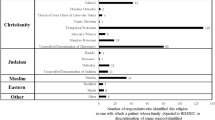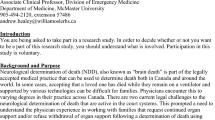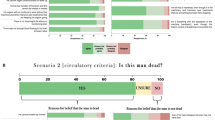Abstract
Background
We sought to evaluate how Muslim allied healthcare professionals view death by neurologic criteria (DNC).
Methods
We recruited participants from two listservs of Muslim American health professionals to complete an online survey questionnaire. Survey items probed views on DNC and captured professional and religious characteristics. Comparative statistical analyses were performed after dichotomizing the sample based on religiosity, and Chi-squared, Fisher’s exact tests, likelihood ratios and the Kruskal–Wallis test were used to assess differences between the two cohorts.
Results
There were 49 respondents (54%) in the less religious cohort and 42 (46%) in the more religious cohort. The majority of respondents (84%) believed that if the American Academy of Neurology guidelines are followed and a person is declared brain dead, they are truly dead; there was no difference on this view based on religiosity. Less than a quarter of respondents believed that outside of organ donation, mechanical ventilation, hydration, nutrition or medications should be continued after DNC; again, there was no difference based on religiosity of the sample. Importantly, half of all respondents believed families should be able to choose whether an evaluation for DNC is performed (40% of the less religious cohort and 60% of the more religious cohort, p = 0.09) and whether organ support is discontinued after DNC (49% of both cohorts, p = 1).
Conclusions
Although the majority of allied Muslim healthcare professionals we surveyed believe DNC is death, half believe that families should be able to choose whether an evaluation for DNC is performed and whether organ support should be discontinued after DNC. This provides insight that can be helpful when making medical practice policy and addressing legal controversies surrounding DNC.


Similar content being viewed by others
Data Availability
Ariane Lewis takes responsibility for the data and accuracy of data analysis.
References
Lewis A, Cahn-Fuller K, Caplan A. Shouldn’t dead be dead? The search for a uniform definition of death. J Law Med Ethics. 2017;45:112–28.
Setta SM, Shemie SD. An explanation and analysis of how world religions formulate their ethical decisions on withdrawing treatment and determining death. Philos Ethics Humanit Med. 2015;10:1–22.
Padela A, Arozullah A, Moosa E. Brain death in Islamic ethico-legal deliberation: challenges for applied Islamic bioethics. Bioethics. 2013;27:132–9.
AB 2565 Assembly Bill. 2008.
New York State Guidelines for Determining Brain Death. 2011.
Illinois Compiled Statutes 210 ILCS 85 Hospital Licensing Act. Section 6.24—Illinois Attorney Resources—Illinois Laws. 2008.
New Jersey Brain Death Statute. 2014.
Lewis A, Adams N, Varelas P, Greer D, Caplan A. Organ support after death by neurologic criteria: results of a survey of US neurologists. Neurology. 2016;87:827–34.
Lewis A, Adams N, Chopra A, Kirschen M. Organ support after death by neurologic criteria in pediatric patients. Crit Care Med. 2017;45:e916–24.
Lewis A. A survey of multidenominational rabbis on death by neurologic criteria. Neurocrit Care. 2019;31:411–8.
Alhawari Y, Verhoff MA, Ackermann H, Parzeller M. Religious denomination influencing attitudes towards brain death, organ transplantation and autopsy: a survey among people of different religions. Int J Legal Med. 2019; Epub ahead of print.
Segal E. Religious objections to brain death. J Crit Care. 2014;29:875–7.
Al-Mousawi M, Hamed T, Al-Matouk H. Views of Muslim scholars on organ donation and brain death. Transpl Proc. 1997;29:3217.
Chamsi-Pasha H, Albar MA. Do not resuscitate, brain death, and organ transplantation: Islamic perspective. Avicenna J Med. 2017;7:35–45.
Miller AC. Opinions on the legitimacy of brain death among Sunni and Shi’a scholars. J Relig Health. 2016;55(2):394–402.
Padela AI. The perspectives of Islamic jurists on the brain death as legal death in Islam. J Relig Health. 2016;55(4):1215–7.
Arbour R, AlGhamdi HMS, Peters L. Islam, brain death, and transplantation: culture, faith, and jurisprudence. AACN Adv Crit Care. 2012;23(4):381–94.
Krawietz B. Brain death and Islamic traditions: shifting border of life? In: Brockopp JE, editor. Islam ethics life abort war Euthan. Columbia: University of South Carolina Press; 2003. p. 194–213.
IIFA. Resolut Int Fiqh Acad its 3rd Sess Brain Death Majallat al-Majmaʿ al-Fiqh al-Islāmī al-Duwalī 3 809. 1986.
Khalid I, Hamad WJ, Khalid TJ, Kadri M, Qushmaq I. End-of-life care in muslim brain-dead patients: a 10-year experience. Am J Hosp Palliat Med. 2013;30:413–8.
Virk v. Detroit Receiving Hospital and University Health Center, 1996 Michigan App. Lexis 750, 1996 WL 33348748 (Mich. Ct. App. October 25, 1996).
Choong KA, Rady MY. Re a (a child) and the United Kingdom code of practice for the diagnosis and confirmation of death: should a secular construct of death override religious values in a pluralistic society? HEC Forum. 2018;30:71–89.
Harris PA, Taylor R, Thielke R, Payne J, Gonzalez N, Conde JG. Research electronic data capture (REDCap): a metadata-driven methodology and workflow process for providing translational research informatics support. J Biomed Inform. 2009;42:377–81.
Duivenbode R, Hall S, Padela AI. Assessing relationships between muslim physicians’ religiosity and end-of-life health-care attitudes and treatment recommendations: an exploratory national survey. Am J Hosp Palliat Med. 2019;36:780–8.
Ahmed M, Kubilis P, Padela A. American Muslim physician attitudes toward organ donation. J Relig Health. 2018;57:1717–30.
Hamouda MA, Emanuel LL, Padela AI. Empathy and attending to patient religion/spirituality: findings from a national survey of Muslim physicians. J Health Care Chaplain. Routledge; 2019; Epub ahead of print.
Mahdi S, Ghannam O, Watson S, Padela AI. Predictors of physician recommendation for ethically controversial medical procedures: findings from an exploratory national survey of American Muslim physicians. J Relig Health. 2016;55:403–21.
Qazi F, Ewell JC, Munawar A, Asrar U, Khan N. The degree of certainty in brain death: probability in clinical and Islamic legal discourse. Theor Med Bioeth. 2013;34:117–31.
Miller A, Ziad-Miller A, Elamin EM. Brain death and Islam: the interface of religion, culture, history, law, and modern medicine. Chest. 2014;146:1092–101.
Akrami SM, Osati Z, Zahedi F, Raza M. Brain death: recent ethical and religious considerations in Iran. Transpl Proc. 2004;36:2883–7.
Boobes Y, Daker N. What it means to die in Islam and modern medicine. Saudi J Kidney Dis Transpl. 1996;7:121–7.
Bedir A, Aksoy Ş. Brain death revisited: it is not “complete death” according to Islamic sources. J Med Ethics. 2011;37:290–4.
Padela AI, Qureshi O. Islamic perspectives on clinical intervention near the end-of-life: we can but must we? Med Health Care Philos. 2017;20:545–59.
Padela A, Mohiuddin A. Islamic goals for clinical treatment at the end of life: the concept of accountability before god (Taklīf) remains useful: response to open peer commentaries on “ethical obligations and clinical goals in end-of-life care: deriving a quality-of-life. Constr. Am. J. Bioeth. 2015;15:W1–8.
Rady MY, Verheijde JL. Brain-dead patients are not cadavers: the need to revise the definition of death in Muslim communities. HEC Forum. 2013;25:25–45.
Hamdy S. Not quite dead: why Egyptian doctors refuse the diagnosis of death by neurological criteria. Theor Med Bioeth. 2013;34:147–60.
Altınörs N, Haberal M. Brain death and transplant in Islamic countries. Exp Clin Transpl. 2016;3:48–52.
Lewis A, Varelas P, Greer D. Prolonging support after brain death: when families ask for more. Neurocrit Care. 2016;24:481–7.
Liao S, Ito S. Brain death: ethical challenges to palliative care concepts of family care. J Pain Symptom Manag. 2010;40:309–13.
Burt RA. The medical futility debate: patient choice, physician obligation, and end-of-life care. J Palliat Med. 2002;5:249–54.
Smith ML, Flamm AL. Accommodating religious beliefs in the ICU: a narrative account of a disputed death. Narrat Inqu Bioeth. 2011;1:55–64.
Spike J, Greenlaw J. Ethics consultation: persistent brain death and religion—must a person believe in death to die? J Law Med Ethics. 1995;23:291–4.
Flamm AL, Smith ML, Mayer PA. Family members’ requests to extend physiologic support after declaration of brain death: a case series analysis and proposed guidelines for clinical management. J Clin Ethics. 2014;25:222–37.
Padela AI, Malik AY, Curlin F, De Vries R. [Re]considering respect for persons in a globalizing world. Dev World Bioeth. 2015;15:98–106.
Padela AI, Duivenbode R, Quinn M, Saunders M. Study protocol for ‘informing American Muslims about organ donation (I AM a LD)’. Soc Sci Protoc. 2019;2:1–17.
The University of Chicago Initiative on Islam and Medicine [Internet]. [cited 2020 Mar 10]. Available from: https://voices.uchicago.edu/islamandmedicine/organdonationandeolc/.
Acknowledgements
The authors would like to thank all the healthcare professionals who completed this survey, and acknowledge the assistance of the American Muslim Health Professionals and Chicago Muslim Medical Association for allowing this survey to be fielded on their platforms.
Author information
Authors and Affiliations
Contributions
AL was responsible for conception and design, analysis and interpretation of data, drafting the manuscript, statistical analysis, and final approval of the manuscript. EK was responsible for design, critical revision of the manuscript, and final approval of the manuscript. AP was responsible for design, distribution, critical revision of the manuscript, and final approval of the manuscript.
Corresponding author
Ethics declarations
Source of Support
None.
Conflict of interest
These authors have no relevant disclosures.
Ethical Approval/Informed Consent
This study was exempt from IRB review at both NYU Langone Medical Center and the University of Chicago’s Biological Sciences Division.
Additional information
Publisher's Note
Springer Nature remains neutral with regard to jurisdictional claims in published maps and institutional affiliations.
Electronic supplementary material
Below is the link to the electronic supplementary material.
Rights and permissions
About this article
Cite this article
Lewis, A., Kitamura, E. & Padela, A.I. Allied Muslim Healthcare Professional Perspectives on Death by Neurologic Criteria. Neurocrit Care 33, 347–357 (2020). https://doi.org/10.1007/s12028-020-01019-w
Published:
Issue Date:
DOI: https://doi.org/10.1007/s12028-020-01019-w




